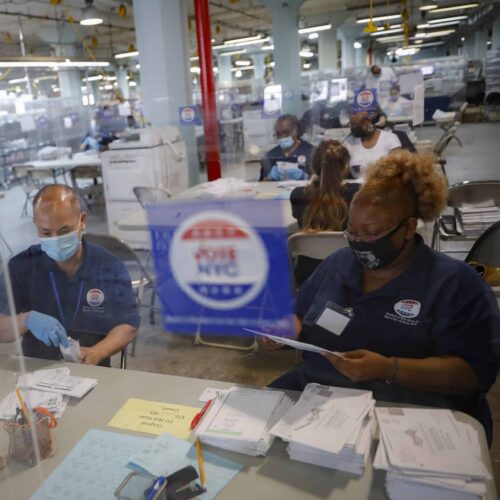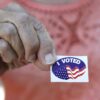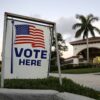Introduction
In March, President Donald Trump phoned into the show “Fox & Friends” on Fox News to talk about his negotiations over a coronavirus aid bill. Democrats in Congress had been pushing to include billions to assist states in expanding mail-in voting, ensuring voters wouldn’t have to risk exposure to the virus on Election Day.
Trump was adamant that he wouldn’t sign a bill that helped expand voting.
Sign up for The Moment newsletter
Our CEO Susan Smith Richardson guides you through conversations and context on race and inequality.
“The things they had in there were crazy,” Trump said. “They had things, levels of voting that if you’d ever agreed to it, you’d never have a Republican elected in this country again.”
Trump was laying out a strategy that Republicans would use in the courts that would make it more difficult to vote. In more than 300 voting cases nationally, they’ve either filed suit to strike election rules that encourage higher voter turnout, or opposed lawsuits from voting rights advocates that would expand voting.
Leaders of some large corporations like Blackstone and Charles Schwab are bankrolling the legal fight to keep people from voting, and some of the cases are being heard by judges that were appointed by Trump and confirmed by a Republican Senate that has been almost singularly focused on packing the judiciary with conservatives after holding positions vacant during the Obama administration.
The Trump campaign and Republican National Committee (RNC) have pushed one narrative in a raft of nearly identical lawsuits from California to Pennsylvania all tied around limiting mail-in voting. The central theme: claims, without evidence, that widely used mail-in voting would lead to massive voter fraud. Independent reviews of past voter fraud by mail, including in five states that already vote almost exclusively that way, have found the crime to be incredibly rare, including less than 0.0009% of votes according to a study by the Brennan Center for Justice.
Under a heading that appears in several of the suits, the RNC and the Trump campaign, joined by local Republicans, warn about “The Perils of Hastily Moving to Universal Vote-By-Mail Without Necessary Safeguards.”
The complaints allege that mistakes in voter rolls, and issues with mail delivery, “have the potential for widespread, scalable abuse and are incredibly difficult to detect.”
The commonalities in the complaints stood out to Danielle Lang, a litigator with the Campaign Legal Center (CLC) who has faced off against Republican legal teams in several of the cases.
“A number of the lawsuits … have pages and pages of copy-and-paste from one lawsuit to another,” she said during a recent event hosted by CLC, a nonpartisan voting rights advocacy group, in response to a question posed by the Center for Public Integrity.
“It’s been an interesting experience to be on the other side of those and see the same allegations, fearmongering about vote by mail security with exactly the same paragraphs, whether they are suing in Montana or New Jersey,” she said.
Some of the judges have expressed frustration at the generic language in Republican complaints.
“When pressed during the hearing in this matter, the Plaintiffs were compelled to concede that they cannot point to a single instance of voter fraud in Montana in any election during the last 20 years,” Judge Dana Christensen, an Obama appointee to the United States District Court in Montana, wrote in his order rejecting the RNC’s complaint in that state.
Although the lawsuits continue to draw attention to Trump’s claims of voting fraud, they haven’t been broadly successful at changing voting rules, according to Rick Hasen, an election law expert who is a professor at the University of California, Irvine School of Law.
“The Trump campaign and Republicans have lost every claim so far where they have tried to argue that a measure to allow for easier voting during the pandemic is unconstitutional because it would facilitate voter fraud,” Hasen noted in an email. “Both Democratic and Republican appointed judges have found that the Trump claim did not present any reliable evidence of a large problem with fraud.”
Republicans have been successful in maintaining stricter voting rules in some states, and preventing expansion in others, by mostly arguing over whether state legislatures and governors can change voting rules during an election year.
About a quarter of the judges sitting on the federal bench today were appointed by Trump, which he touts as a major accomplishment. It’s a number that was reached through maneuvering by both Democratic and Republican Senate leaders. In 2013, frustrated by a Republican strategy of blocking Obama nominees, then-Senate Majority Leader Harry Reid invoked a rule change that eliminated the Senate’s filibuster rule for appointing judges to the federal bench, dropping the threshold to a simple majority, while keeping the 60-vote requirement for Supreme Court appointees.
Although Trump has filled 194 vacancies on the federal courts, that number is still dwarfed by the 312 judges Obama appointed during his eight years in office who are currently serving, representing nearly 40% of the bench.
In one voting rights case, Trump’s success in appointing judges has paid immediate dividends.
In 2018, Florida voters approved a state constitutional amendment that would restore voting rights to felons after they had completed their terms in prison. That meant 1.4 million Floridians, disproportionately people of color, who historically have voted overwhelmingly for Democrats, would have a chance to vote in 2020.
The state’s Republican-controlled legislature, encouraged by Republican Gov. Ron DeSantis, in 2019 passed a new law in response, requiring those seeking to regain voting eligibility pay all outstanding fines and fees. Voting rights advocates called it a modern-day poll tax, and one that would be difficult to even comply with because court records are difficult to access and many don’t know how much they owe.
Voting rights advocates filed suit and convinced a judge to overturn the 2019 law. But the state took the case to the 11th Circuit Court of Appeals, and in a 6-to-4 decision, it overturned the lower court’s ruling, allowing Florida to keep its fines and fees requirement.
Five of the six judges who voted in favor of allowing the fees to stand were appointed by Trump. The sixth, Chief Judge William Pryor, was publicly named by Trump in 2016 as a potential nominee to the Supreme Court. Lawyers fighting the law had pushed for three of Trump’s appointees to the court to recuse themselves from the case based on past legal work on the issue. Two of the three judges chose not to recuse themselves, which ended up being the margin of victory for DeSantis.
The result is that upward of 770,000 Floridians, more than half the newly enfranchised total, may not be able to vote this year.
The influence of Trump-appointed judges might not be limited to cases shaping voting rules ahead of the election. The RNC is preparing teams of lawyers to fan out across the country to contest results on Election Day and beyond, ready to file lawsuits as the masses of mail-in ballots are tallied. Some experts anticipate the counting lasting for days or even weeks after the election.
The lawsuits that might be brought would likely get a boost from a 2014 rule change allowing national political parties to collect large donations in a party legal fund. The fund has been put to work fighting a wide range of court battles during Trump’s term in office, from combating accusations of sexual harassment by a former Trump campaign aid, to legal wrangling around the Russia investigation.
Before the 2014 law, donors were limited to a maximum donation of $2,800 for RNC or Democratic National Committee legal needs, but the special funding mechanism approved that year and pushed by Democratic lawyer Marc Elias, made it legal to contribute much more to each of several types of party accounts including $106,5000 per donor for 2020. Trump has dipped into those funds to pay the Washington law firm Consovoy McCarthy, which has steered the legal teams filing many of the voter-fraud focused complaints nationally.
Although the RNC is not required to disclose which cases its payments to the law firm cover, it has doled out more than $2.7 million to Consovoy so far in 2020, according to federal campaign finance records.
For the 2020 election cycle, most titans of Republican politics have donated funding propping up the legal account, either directly or transferred from other campaign accounts. Sheldon and Miriam Adelson, owners of the Sands casino groups, and the largest Republican donors for this cycle according to numbers compiled by the Center for Responsive Politics, donated a combined $213,000 that was moved into the legal account, the maximum permitted. Richard and Elizabeth Uihlein, owners of the packaging products company Uline and the second-largest Republican donors, directly contributed the maximum.
Charles Schwab, CEO of the eponymous financial firm, and Stephen Schwarzman, CEO of Blackstone, each donated the maximum $106,500 directly to the legal fund.
Combined, more than $3 million had been directly donated to the RNC’s legal efforts through September with more than $20 million total being added to the fund when including donations moved from other campaign accounts, according to a Public Integrity analysis of Federal Election Commission records.
RNC-funded lawyers continue to challenge election provisions that make it easier to vote based on the notion of voter fraud. A string of lawsuits in Iowa aimed at preventing county auditors from filling in voter ID numbers on absentee ballot request forms proved successful, forcing auditors to resend ballots. Republican lawyers argued that including the numbers would make it too easy for criminals to forge ballots.
In an Aug. 31 interview with Fox News, Trump warned that Democrats were also busy building a team of lawyers, and said that he had his own army ready to go and that he’d continue to wage battle in court.
“They have more lawyers than any human being has ever hired,” Trump said. “The Democrats have lawyers, and we do, too. We’re in Pennsylvania right now. We’re in Nevada right now. We’re in all different states fighting this.”
Chris Zubak-Skees contributed to this report.
Read more in Money and Democracy
Barriers to the Ballot Box
Analysis: New and age-old voter suppression tactics at the heart of the 2020 power struggle
Making voting harder is about grabbing even more disproportionate power and delaying the impact of shifting demographics.





Join the conversation
Show Comments